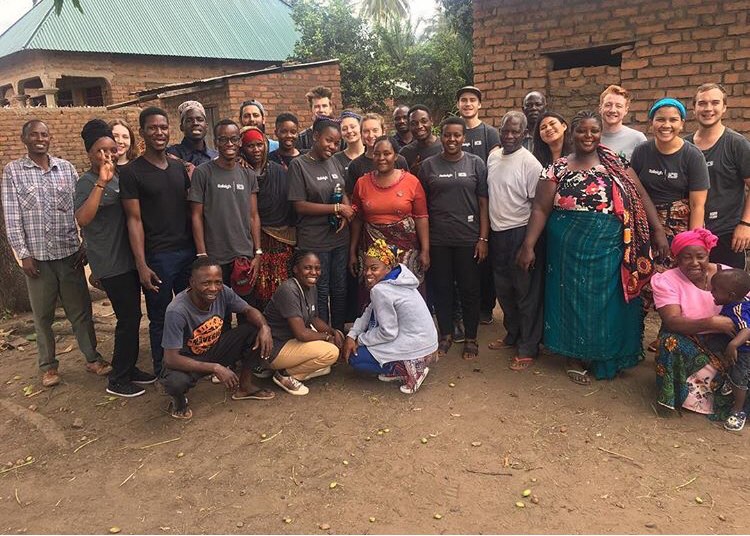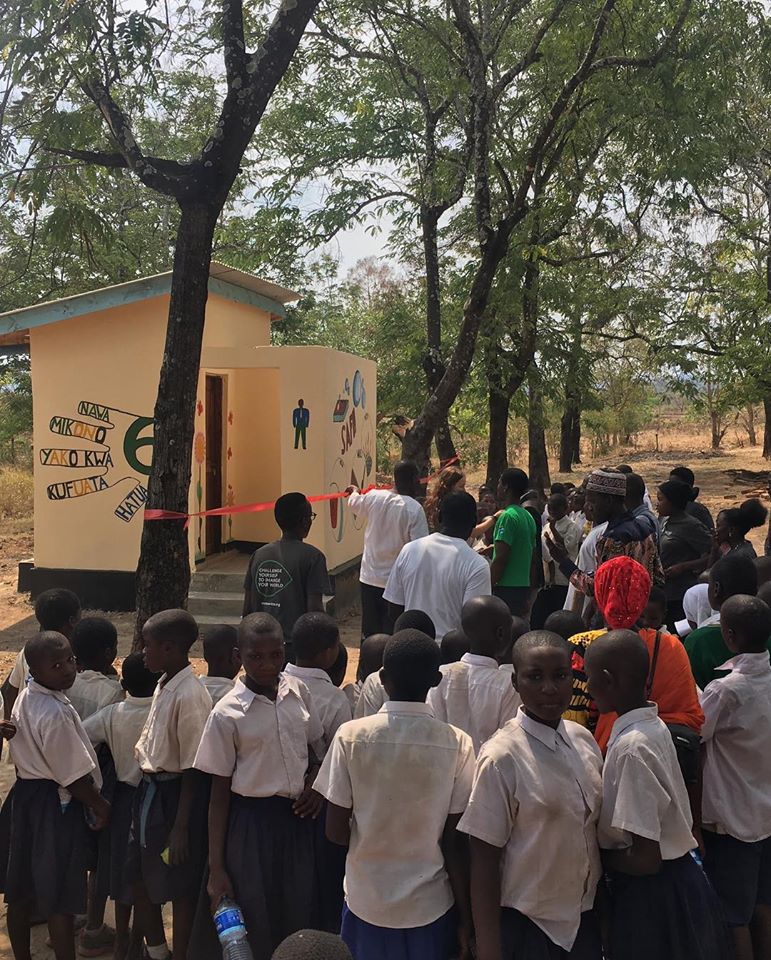This blog was originally written in October 2018 and submitted to Raleigh International to be published on the blog section of their website. It was at their request that I wrote this blog, they never got back to me.
Bwawani is a village situated in the Kilombero area of Morogoro District, Tanzania. It was formerly a part of the much larger Nyamweze township. However, leadership issues in this very large community led to it breaking off into three separate villages – Bwawani, Nyamweze and Kiberege – back in 2013, with no jurisdiction over each other.

Now the village is stuck in a strange border situation where on one side of the road you’re inside one village, but when you cross it, you’re in another. An example I could compare this to would be the strange borders between the Netherlands and Belgium at Baarle-Nassau/Baarle-Hertog, where some houses are even split between the two independent nations. Luckily, the Schengen area allows this to be a non-problem, but my thoughts go out to the homeowners if the EU ever disbands.
Back to Bwawani, and these fledgling villages that were struggling to rally behind their new leaders. The group of volunteers that I worked in, Charlie One, worked in the ‘Kiberege School’ – which itself was a source of conflict between these communities, as both the schools namesake and Bwawani claimed ownership of the establishment. The school was initially built as a teaching and rehabilitation centre for the nearby Kiberege prison, but a government decree turned it in into a place of education for children. The school still had memories of prison ownership with its iron barred windows and chicken wire but was juxtaposed by the vibrant nature and creativeness from the excitable children. It is worth noting that the 40-minute walk from Bwawani to the school was through the prison fields where the inmates worked, fields that my Charlie walked through from Monday to Friday for five weeks. Most days there were no inmates working, but when there was, they would often shout, beg, or attempt to run over. Interacting with prisoners is illegal in Tanzania, so we just had to keep our eyes forward and walk. This was made all the more difficult as prisoners were hired to actually dig the hole for the septic tank of the new teachers’ toilets, little more than five metres from a classroom of bustling children.

A village that formerly had two cycles of volunteers, the community of Bwawani was already educated on the benefits of hand washing and hygiene, with the Village Executive Officer (VEO) enforcing a TSH50,000 fine if your home did not contain hand washing facilities with soap.
The school was also well versed on the dangers of poor food preparation and personal hygiene. Countless songs regarding these important messages could be heard echoing from the classrooms. Strangely for Kiberege school, the toilets Raleigh had spent six months and two volunteer cycles constructing remained unused and were beginning to fall into disarray.
We in Charlie One believed this to be strange. The children, so excitable and informed on the issues of hygiene were still using the old and decrepit drop-hole toilets that lacked any sort of sanitation. All the while the new and freshly built, flushable latrines fell to the wayside, it made little sense. Why were we here?
After a week in Bwawani things became increasingly clear, we had heard murmurs from the students that the teachers were not allowing them to use the toilets. This was despite the teachers informing us that the opposite was true, that the students were refusing to use them due to being “intimidated” by their new and shiny design. Which was strange considering the students had been using them daily since we had arrived.

The day of our first School Management Committee (SMC) meeting arrived, and everything came to a head, like a lifting of fog. The headteacher and the committee denied all knowledge of an opening ceremony for the new toilets and claimed that they had never received ownership of them, despite being in the presence of our District Operations Manager Kim, a team leader on the last cycle who had worked on these exact toilets.
This was all in-fact false information. Infuriated by this, Kim informed the red-faced SMC that she was present and led those events herself. Faced with this, they admitted their defeat and confirmed that they had not touched the toilets in one year (the reason for this was unclear and lost in translation, and I do not wish to assume incorrectly – but we were building a set of teachers’ toilets for this particular school so I will leave the assumptions to you dear reader). As a result of this, the toilets had become infested with maggots and were slowly reaching the point of becoming unusable. In the end, after the previous (and supposedly final) cycle had left, the SMC had virtually disbanded and the district leaders that were bestowed with checking up on the cubicles had failed to do so. The school had not been held accountable for their lack of toilet maintenance and they had essentially been left to rot.
We were all gobsmacked at this revelation, but we were on the ground here for another four weeks and work had already started on the new toilets. These kids could not be left with the toilets in the state that they were, and the surrounding community were still engaging in traditional acts surrounding women’s menstruation that no longer had a place in modern society (one of which will be detailed later). Whatever the motivations of the school organisation we still had a job to do.
We held a community ‘Action Day’ to discuss issues surrounding water and sanitation hygiene, with particular focus on the normality of women’s menstruation health management (MHM). Over 300 people attended and backed the cause. Epitomising this was our men’s MHM corner; we had the idea to have two ‘corners’ during our Action Day and take shifts occupying them. The purpose of these were for men and women who had questions on MHM to come and privately ask us advice and guidance.

During my shift, a man approached me and my Team Leader Sarya and asked us whether female periods were healthy. We explained to him their normality for all girls around the globe. His face was visibly shocked; he informed us that he had been locking his daughters in a ‘red-room’ for seven days a month and not letting them out until their menstruation period had concluded. This is because in certain segments of rural Tanzania there are beliefs that ovulating women can make men impotent. These opinions are influenced by decades of enforcement, tradition and cultural differences. It was not his intention to mistreat these young women, but to protect the ongoing heritage and future generations of his family. It shows that even a simple conversation can make a massive difference to a domino effect of people. He swore to us that he would never do anything like that again.
With this fresh in our minds we took this to the SMC at Kiberege school, we told them the importance of MHM, and they allowed us to teach it in their school with the additional support of the parents. We also stressed the importance of a consistently clean and monitored MHM room (one was constructed with the toilets) and the importance of hygiene materials in the schools such as soap, toilet brushes and bleach, to which they agreed. Things were finally beginning to look up.
It was around this time that nearly all of my teams work boots were stolen. During the night they were kept in the locked storage room of the school. Fortunately for me, I had taken mine home that evening to clean them. The next day we returned to see no signs of struggle or forced entry, the padlock was still on the door and all the school’s belongings were still in place. Many of these boots were purchased by both my British and Tanzanian counterparts, and work had to stop for about a week until we could get replacements.
Community mobilisation meetings followed, we gathered up groups of elders, women and young adults to conduct in-village surveys on their current knowledge. We contacted local businesses to see what stock they supplied regarding hygiene. In Bwawani, there were few shops that supplied sanitary pads and puritabs, yet all of them stocked bars of soap and its powdered variant. We then invited all of these business leaders to a meeting at the school and openly encouraged the SMC to pursue business relations with them to keep their toilets stocked, because, and this was stressed – we were not coming back again.
The efforts we had made finally started sticking in the final few days of our project.

This was worth pursuing at Kiberege school for the benefit of the children who studied there; the next generation always deserves a chance. The opening ceremony of our very own teachers’ toilets followed and was a complete success. We ensured that they had the keys and could not claim that they “didn’t have any”. We left Bwawani truly feeling that we had made a difference against all odds. We headed into our next adventure after a quick recharge in Morogoro. The next stop was Chimlata School in the Kongwa district of Dodoma.
Upon re-reading and re-editing this article I find myself frustrated at myself for not further pursuing what was going on under the surface at Kiberege School. However, the situation me and my colleagues were under was very difficult both physically and emotionally. After the departure of my team, the School Management Committee fell back into old habits, however this time there were repercussions from the now rejuvenated district and their passionate Village Environmental Officer. The headteacher of Kiberege school has since been sacked and replaced. Here’s hoping that their new hire places the children first, investing in their futures – rather than insisting on ‘business as usual’.
I truly believe that Raleigh International does fantastic work, but it does highlight the difficulties of AID work in third-world countries with regards to potential corruption. That is not even touching on the ‘white-saviour complex’.
But that is a topic for another day.
Finally, I just want to give a massive thank you to Amy Pragnell, Phoebe Nelson and Bryn Williams for their invaluable assistance in writing this blog post. You guys rock.
